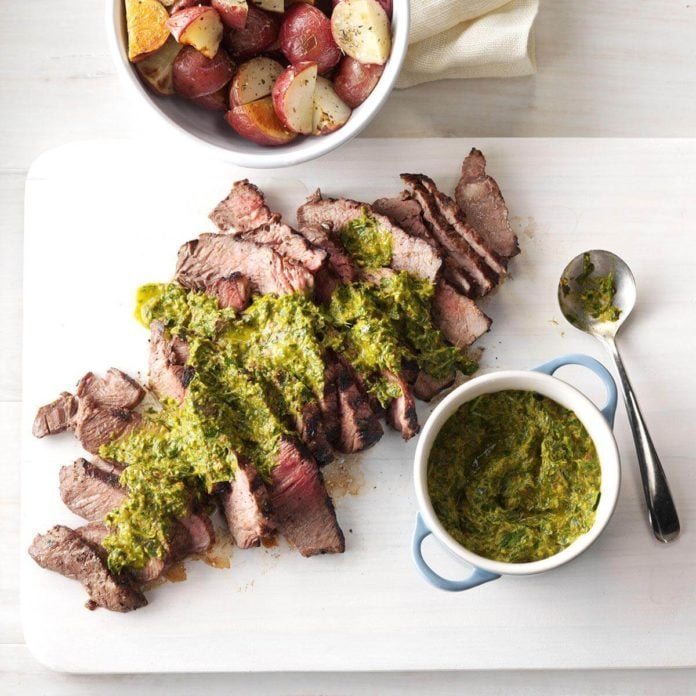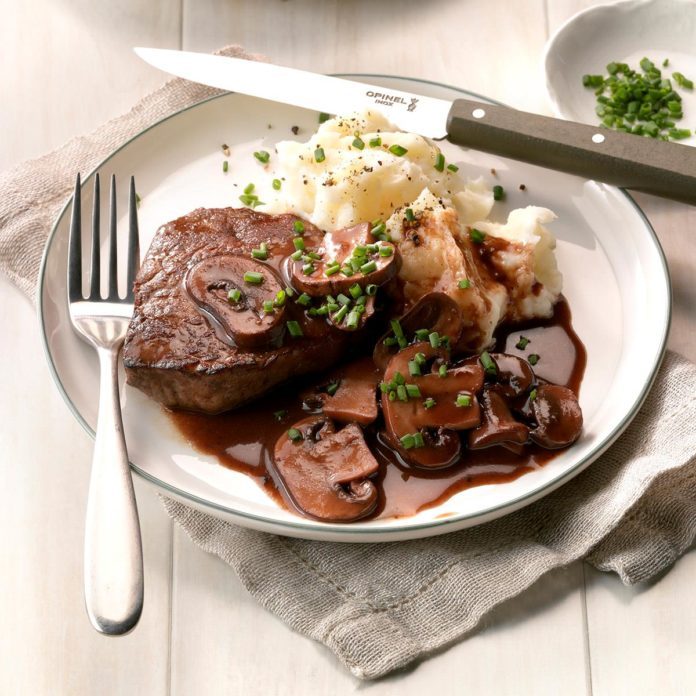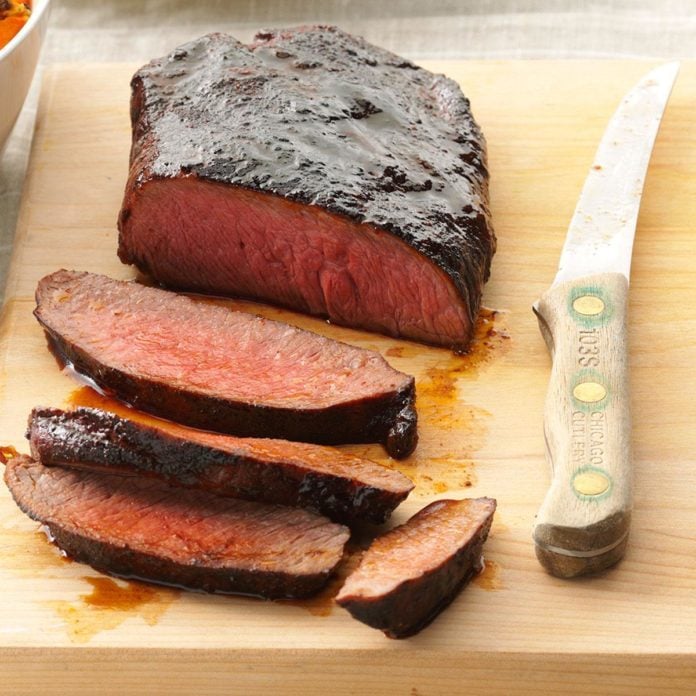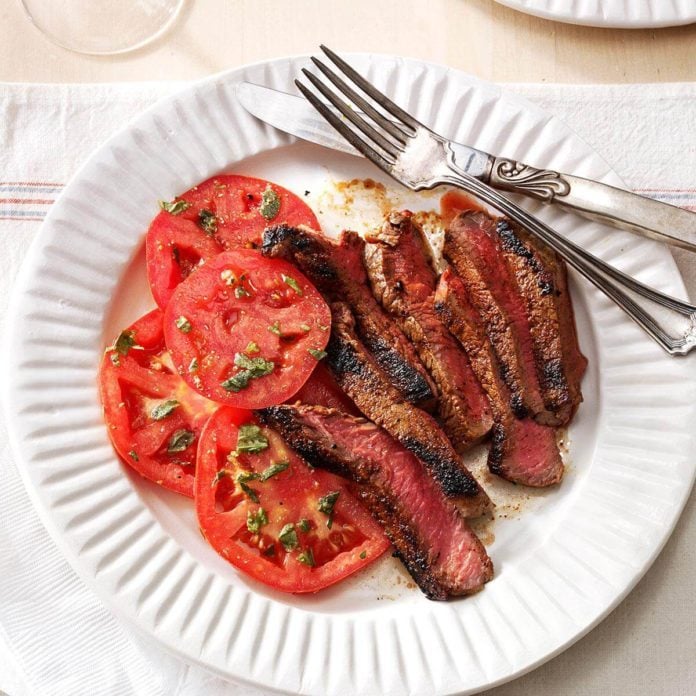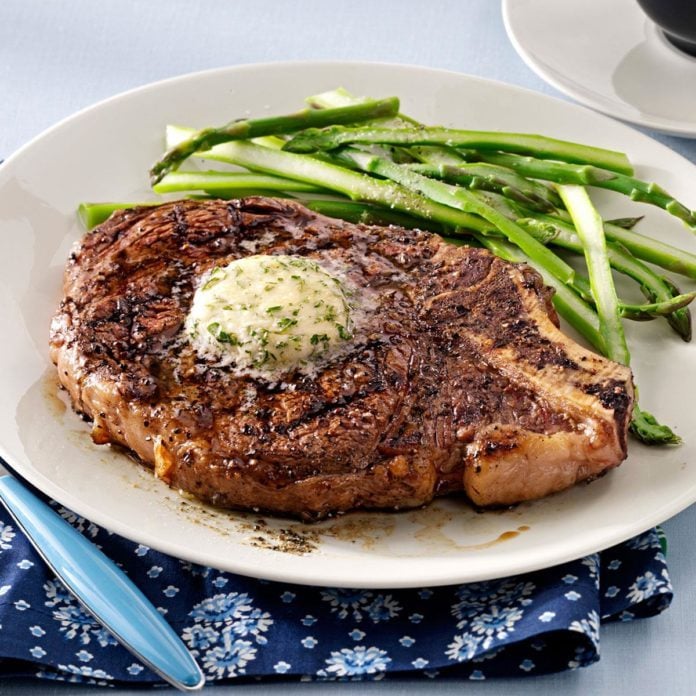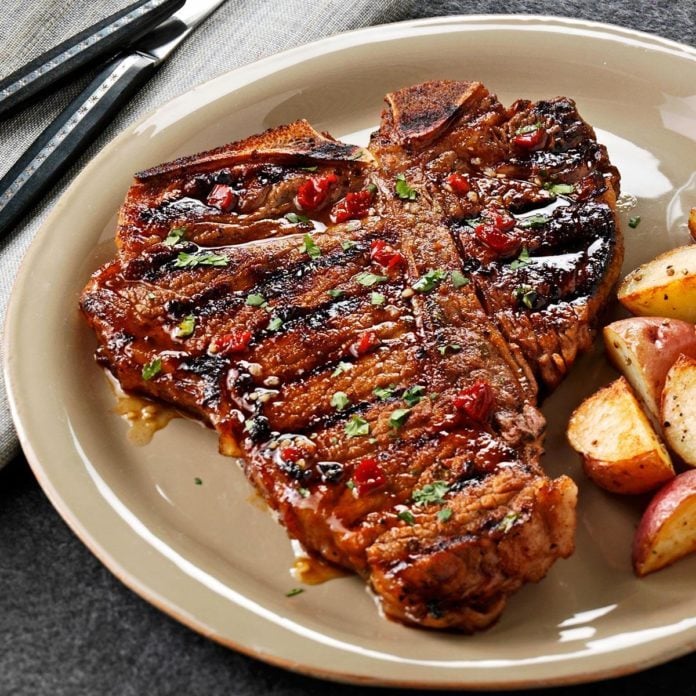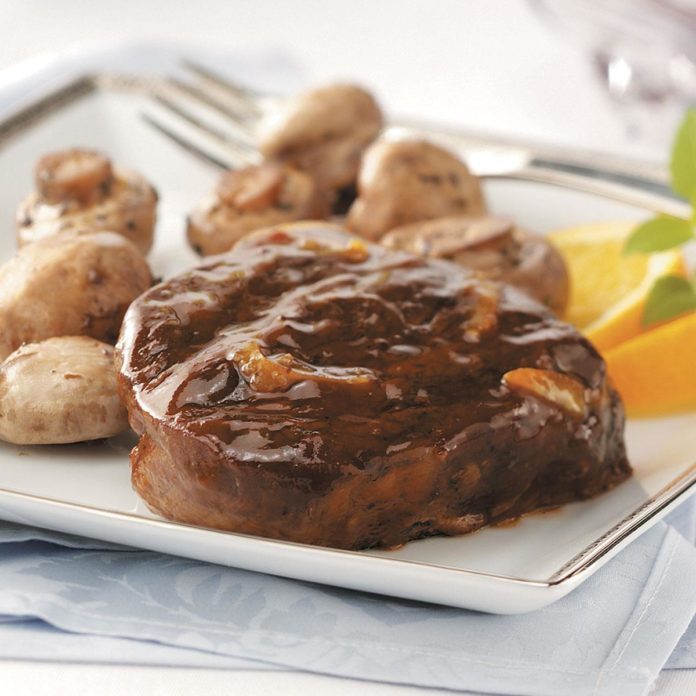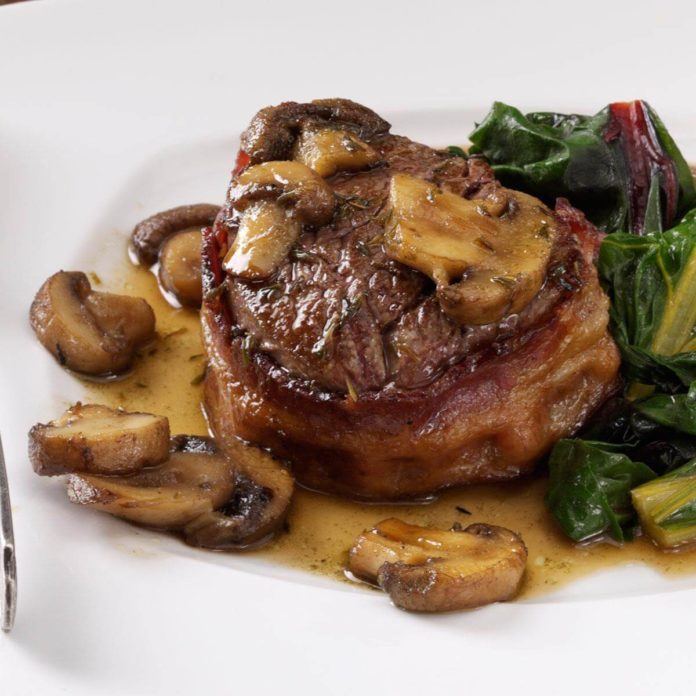Steak gets a flavor kick from chimichurri. This piquant, all-purpose herb sauce is so versatile, it complements most any grilled meat, poultry or fish. —Laureen Pittman, Riverside, California
Get Recipe
These tasty steaks seem special but they are fast enough for everyday dinners. We enjoy the mushroom-topped fillets with crusty French bread, mixed salad and a light lemon dessert. —Christel Stein, Tampa, Florida
Get Recipe
I love the combination of the sweet citrus marinade and the strong tang of the blue cheese butter. And my kids just love flank steak. —Gwen Wedel, Augusta, Michigan
Get Recipe
I grew up watching my grandmother and mother in the kitchen. My grandparents came from Mexico, and this steak marinated in beer and lime juice honors their passion for cooking. —Adan Franco, Milwaukee, Wisconsin
Get Recipe
Unique and simple to prepare, this delicious pasta dish is filled with fresh flavors, and it’s as healthy as it is hearty. Best of all, it takes just 30 minutes to set this meal on the table. —Frances Pietsch, Flower Mound, Texas
Get Recipe
For a mouthwatering change of taste at your next barbecue, take steak to new flavor heights by basting your choice of cuts with a great garlicky blend that requires only a few minutes to fix. —Taste of Home Test Kitchen
Get Recipe
It takes just minutes to broil this nicely seasoned flank steak. Slice the meat on an angle across the grain for the most tender results. You can substitute a pound of sirloin steak instead of the flank steak. —Taste of Home Test Kitchen, Milwaukee, Wisconsin
Get Recipe
These steak kabobs not only satisfy my love of outdoor cooking, they feature a mouthwatering marinade, too. It's terrific with chicken and pork, but I prefer it with beef because it tenderizes remarkably well. —Christi Ross, Guthrie, Texas
Get Recipe
I like to make this on special occasions. The tender steak cuts easily into appetizing spirals for serving, and extra stuffing cooks conveniently in a foil packet on top of the steak. —Diane Hixon, Niceville, Florida
Get Recipe
My husband and I both love the classic combination of beef and horseradish. He asks me to make this for dinner often, and I'm always happy to. Try serving with baked potatoes as a side.—Mary Lou Cook, Welches, Oregon
Get Recipe
Just a skillet, a couple juicy steaks, fresh mushrooms and a few simple ingredients prove it doesn't take much fuss to fix a special meal for two. —Denise McNab, Warminster, Pennsylvania
Get Recipe
When these flavorful skewered steaks are sizzling on the grill, the aroma makes everyone around stop what they're doing and come see what's cooking. The tasty marinade is easy to make, and these little steaks are quick to cook and fun to eat. —Jeri Dobrowski, Beach, North Dakota
Get Recipe
Bold seasonings give meat and potatoes a Southwest twist. Feel free to adjust the heat factor by using more or less chili powder. —Kenny Fisher, Lancaster, Ohio
Get Recipe
This is a wonderful, cheesy recipe that melts in your mouth. I love this traditional Canadian meal. It certainly has a special feel; the sauce is a fantastic complement to steak. —Susan Jerrott, Bedford, Nova Scotia
Get Recipe
My ribeye steak showcases the flavors of Greece my husband and I were introduced to while on a cruise. We like it with pita bread and hummus. —Mary Lou Cook, Welches, Oregon
Get Recipe
Even though steak is always a winner in our house, to make it even more special I add jarred salsa verde and top with freshly chopped tomato and avocado. —Lily Julow, Lawrenceville, Georgia
Get Recipe
This juicy steak rubbed with espresso, cocoa and pumpkin pie spice is one of my husband’s favorites. Broiling is a good year-round method, but we love making it on the grill, too. —Deborah Biggs, Omaha, Nebraska
Get Recipe
The flavor of the tomatoes improves after they marinate overnight. I could eat them all by themselves! Our family likes these steaks best served with cheesy potatoes or glazed green beans.—Anna Davis, Half Way, Missouri
Get Recipe
With this quick recipe, you get a tender steak without a long marinade. Balsamic vinegar and steak sauce give it tang, and you can't go wrong with the melty Swiss on top. —Peggy Woodward, Shullsburg, Wisconsin
Get Recipe
Sometimes, I add more mushrooms to this recipe when my son's eating dinner—he loves them, and they are just fantastic with the steak. — Carolyn Turner, Reno, Nevada
Get Recipe
This is one of my favorite flat iron steak recipes. If you haven't already enjoyed the rich, creamy pairing of blue cheese with your favorite steak, stop reading and get cooking! I take it a step further by folding in a little butter to make the dish even more drool-worthy. —Amanda Martin, Monson, Massachusetts
Get Recipe
We love skirt steak in our house. To make it a meal, I created a ranch-inspired bread salad with the best flavor combinations - creamy, tangy, sweet and fresh. — Devon Delaney, Westport, Connecticut
Get Recipe
I make this recipe for special occasions. The tantalizing fragrance of the herbs de Provence is unforgettable. The seasoning and herb butter goes well with filet mignon, T-bone and steak strips, too. —John Baranski, Baldwin City, Kansas
Get Recipe
This recipe stars a delectable sauce made with wine, plump cherries, and steak portioned just right. —Jacob Kitzman, Seattle, Washington
Get Recipe
My wife adores this steak—and me when I fix it for her. She thinks it’s the ideal dish for Friday night after a long workweek. —Michael Rouse, Minot, North Dakota
Get Recipe
If you like to kick things up on the grill, this is the steak for you. My husband even makes this in a Dutch oven, and the meat just sizzles. —Donna Goutermont, Sequim, Washington
Get Recipe
I found this wonderful, quick recipe in a book years ago. It’s been a favorite for special occasions ever since! I like to serve it with twice-baked potatoes and a spinach salad. —Janet Singleton, Bellevue, Ohio
Get Recipe
This beef tenderloin recipe is a family favorite that's quick and always satisfying. The creamy sauce has the perfect blend of horseradish and mustard. —Marie Rizzio, Interlochen, Michigan
Get Recipe
With the punch of peppercorns and a smooth, beefy sauce, this steak is delicious. You'll love the hint of sweetness the bittersweet chocolate adds to the savory meat. —Crystal Bruns, Iliff, Colorado
Get Recipe
When I want to provide a memorable dinner but don't want to spend hours in the kitchen, this is the recipe I rely on. I've used it many times on holidays or other occasions for a quick, impressive main dish. We relish the savory sauce poured over the steaks. —Pheobe Carre, Mullica Hill, New Jersey
Get Recipe
I've been serving this recipe to family and friends for 20 years and very seldom do I have any leftovers. We try to keep the house cool, so we grill out often. —Mary Hills, Scottsdale, Arizona
Get Recipe
I copied this recipe from a friend's collection 15 years ago. Now whenever we make steak on the grill, this is the recipe we usually use. It's also a tempting dish to serve when entertaining. It's earned me many compliments. —Debbie Bonczek, Tariffville, Connecticut
Get Recipe
For an intimate dinner with close friends, serve this stunning dinner of tenderloin steaks and lobster tail. Your guests will think they are dining at a fine restaurant when you serve them this surf and turf dish. —Taste of Home Test Kitchen
Get Recipe
These juicy ribeye steaks couldn't be easier. I prefer steak, but I’ve also used the seasonings on chicken breasts, fish, veal and hamburgers, so use whatever meat you have. —Karen Haen, Sturgeon Bay, Wisconsin
Get Recipe
I got the idea for this 30-minute recipe when I came across bacon-wrapped filets that were on sale in the grocery store. The rest was inspired by my husband, because he once made a Scotch and ginger ale sauce. This elegant recipe is for two, but it can easily be doubled. —Mary Kay LaBrie, Clermont, Florida
Get Recipe
Although this filet is such a simple recipe, you can feel confident serving it to your guests. The rich sauce adds a touch of elegance. Just add a salad and rolls. —Jauneen Hosking, Waterford, Wisconsin
Get Recipe
Looking to do something a little different with grilled sirloin? Add a smoky heat and chocolaty rich color with this easy 5-ingredient rub. —Healthy Cooking Test Kitchen
Get Recipe
A lime juice marinade really perks up these grilled steaks, and the snappy, light citrus salsa is a super change from the usual heavy steak sauce. I brighten up winter meals by broiling the meat and serving it this way. —Kathleen Smith, Pittsburgh, Pennsylvania
Get Recipe
With all of the ingredients cooked in one skillet, this steak dish couldn't be quicker to prepare...or clean up! But the wine and mushroom sauce makes it seem special. —Sandra Fisher, Monroe, Washington
Get Recipe
